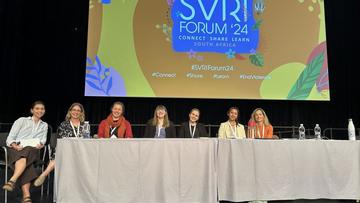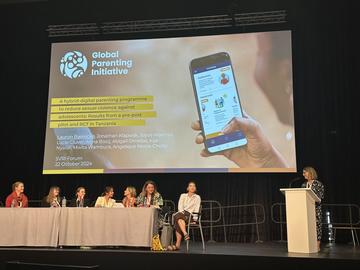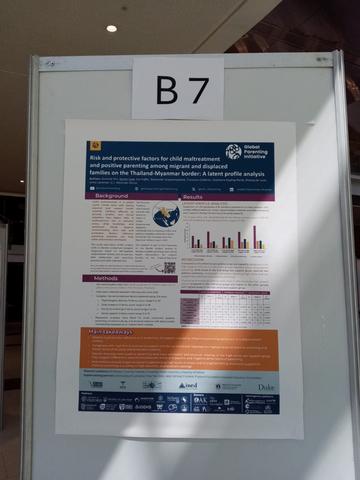Global Parenting Initiative shares Impact at SVRI Forum 2024
The Global Parenting Initiative (GPI) had a dynamic start at the SVRI Forum, hosted by the Sexual Violence Research Initiative. This bi-annual forum brings together organisations to address violence against women, children, and gender-based violence, focusing on challenges in low- and middle-income countries. GPI researchers presented key research findings to help create safer, more equitable communities.
Day 1

The Global Parenting Initiative’s researchers had a jam-packed first day at the #SVRIForum2024 hosted by the Sexual Violence Research Initiative (SVRI). At this bi-annual event organisations come together to address violence against women, violence against children, and other forms of gender-based violence in low- and middle-income countries. We’re proud to have our researchers share their insights and findings on these critical issues, contributing to the global effort to create safer, more equitable communities.
Dr Shallen Lusinga from the University of Cape Town (UCT) presented her work exploring parental perspectives on navigating digital perils. She spoke to South African parents’ in Mpumalanga’s concerns regarding the growing exposure of children to online dangers. These include grooming, manipulation, and scamming with many parents taking restrictive preventative measures to limit their children’s exposure. Dr Lusinga noted that many digital safety interventions are focused on and developed for families in high-income countries and highlighted the importance of a nuanced, adapted approach to engaging parents from low-income settings in digital safety interventions.
Juliet Stromin, also from UCT and part of the team for the Global Parenting Initiative’s ParentText optimisation study in South Africa, presented their insights on the hybrid chatbot-led parenting intervention. The study, also conducted in Mpumalanga was conducted in partnership with mothers2mothers and Clowns Without Borders South Africa (CWBSA) and found that a chatbot intervention paired with a WhatsApp support group showed better engagement and that in-person group sessions weren't as well attended as WhatsApp group discussions.
The parent cohort that received four in-person sessions showed greater increase in equitable behaviours and greater decreases in physical abuse compared to the cohort that only received one in-person session. “The overall conclusion is, however, that the mode of intervention delivery depends largely on your area of interest. If, for example, you’re interested in user engagement, then our data shows that WhatsApp groups and one in-person session would be well suited. If you’re interested in reducing risk of sexual violence, then WhatsApp groups together with four in-person sessions would be a better fit.”
Natalie Davidson (UCT) and Anna Booij (CWBSA) explored the viability of parenting interventions to reduce violence against both women and children, and found that empowering community members to deliver interventions that focus on small achievable shifts in gender attitudes are more effective. The study was conducted in rural Zimbabwe with a co-created and co-adapted intervention with 50 parent pairs and their teen - amounting to a total of 150 people.
Their presentation was followed by Moa Schafer from UNICEF Innocenti and Department of Social Policy and Intervention, University of Oxford (DSPI) who presented findings from the ParentText chatbot implementation across Jamaica and South Africa, speaking to the potential of chatbot parenting interventions to reduce both violence against children and intimate partner violence - especially in resource-limited settings.

Lauren Baerecke (UCT) shared insights from Tanzania, where GPI’s study of a hybrid-digital parenting programme specifically targeted sexual violence against adolescents. The presentation included both pilot results and RCT findings, showing how combining digital delivery with traditional approaches can create more effective interventions for sensitive topics like sexual violence prevention.
The day wrapped up with a jam-packed session. Dr Aya Fujita (DSPI) presented baseline findings from Uganda regarding the vulnerability and risk factors for sexual, physical, and emotional violence against children with disabilities in Uganda. Dr Seema Vyas (DSPI) and Dr Godfrey Siu (Makerere University) presented significant findings from the Parenting for Respectability cluster randomised controlled trial in Uganda.
This research demonstrates how cultural adaptations of parenting interventions can effectively address both violence against women and children simultaneously, with particular attention to local understanding of respectability and family dynamics. Lauren-Jayne van Niekerk's (UCT) presentation focused on engaging fathers through dialogic book-sharing in South Africa and Dr Kathleen Murphy (DSPI) shared crucial insights from Kenya about family violence in the context of street life, presenting findings that can inform the adaptation of parenting programmes for this highly vulnerable population.
Having a platform like the #SVRIForum2024 gives us the power to ensure that women and children globally are safe and we get to learn from other stakeholders and experts about best practices to mitigate violence and improve the lives of those affected by gender-based violence.
Day 2
The Global Parenting Initiative team continued to make an impact at the #SVRIForum2024, hosted by the Sexual Violence Research Initiative (SVRI). Our researchers and partners actively engaged in discussions shared valuable findings and collaborated with global partners to advance the movement toward safer, more equitable communities. Dr Isang Awah shared insights on implementing parenting interventions amid crises, discussing challenges like adapting programmes for displaced families and lessons learned to improve future humanitarian efforts.
“In the past few years, our team of Global Parenting Initiative, and Parenting for Lifelong Health, in collaboration with UN agencies, have developed and disseminated parenting resources to support families affected by different humanitarian crises, including the Ukraine conflict and the 2022 climate crisis in PakistanI.”- Dr. Isang Awah.
Genevieve Haupt Ronnie presented the SUPER (Scale-up of Parenting Evaluations Research) study team’s (Tendai Mutembedza, Natalie Davidson , Mukondi Nethavhakone, Hlengiwe Gwebu, Cathy Ward) findings on taking parenting programmes to scale. They explored effective strategies, barriers, and lessons learned from scaling initiatives in various settings.

A poster titled "Risk and Protective Factors for Child Maltreatment and Positive Parenting among Migrant and Displaced Families from Myanmar" presented by Dr. Seema Vyas highlighted key insights into the experiences of displaced families. The research identified patterns of risk and protective factors affecting parenting and child maltreatment. The findings emphasised the need for tailored interventions that address parental stress, economic hardship, and social support to promote positive parenting and prevent violence against children in humanitarian contexts.
Day two of the #SVRIForum2024 wrapped with a series of impactful four-minute presentations that showcased diverse approaches to preventing violence against children.
Joyce Wamoyi shared findings from a digital programme focused on caregivers, emphasising the importance of customising digital interventions to local contexts for maximum effectiveness. Her presentation highlighted how tailoring solutions to meet specific community needs can significantly enhance programme outcomes.
Roselinde Janowski presented her team’s work on an offline-first app designed for parents of adolescents in Tanzania. The presentation explored strategies to boost user engagement and reduce sexual violence, shedding light on the potential of digital tools to address complex social issues in challenging environments. Godfrey Siu, along with his research team provided baseline insights from the Parenting for Respectability trial in Uganda, focusing on how family structures impact child maltreatment prevalence.
Day 3
The GPI together with some of its partners concluded the #SVRIForum2024 with a scaling workshop titled "Scaling Up of (Parenting) Interventions: A Community of Practice Shared Learning Event”.
The event provided an in-depth exploration of scaling parenting programmes, with a focus on overcoming challenges and maximising impact in various contexts. The speakers highlighted the progress, barriers, and strategies in scaling efforts, especially in reaching underserved populations. Jamie Lachman from GPI, elaborated on the achievements in scaling outputs and impacts across GPI initiatives. He addressed the difficulties in ending child sexual abuse, reaching rural communities, and expanding programs in areas with limited technological infrastructure. Jamie underscored the importance of creating a global framework to reach those in need, emphasising that GPI's programmes are designed to be adaptive and accessible to different communities. He also highlighted the value of play in children’s development and noted the cost, time, and logistical challenges in scaling. Despite these hurdles, the initiative strives to maintain a high level of impact while reaching a broader audience.
Saara Thakur discussed the "GPI way" of scaling, which focuses on increasing reach while ensuring high impact and long-term sustainability. She emphasised the need to balance rapid expansion with quality, citing time constraints and slow government engagement as key challenges.

Representatives from Makerere University, including Godfrey Siu, Betty Okot, Harriet Namulondo , Albert Asiimwe, and Charles Okello, shared insights on the Parenting for Respectability programme. Godfrey explained how the program integrates gender-based violence prevention, caregiving practices, and behaviour change to promote family respectability. The initiative supports both parental couples and single parents, actively mobilising mothers and fathers. Godfrey emphasised that the programme has been well-received, with a significant positive impact on participants. Betty Okot pointed out that scaling efforts are resource-intensive, while Albert Asiimwe and Harriet Namulondo discussed the role of community radio in disseminating information during the scaling process. Charles Okello presented the programmme’s initial lack of a disability inclusion component, stressing the need to incorporate strategies for parenting children with disabilities.
Advocate Tarisai Mchuchu-MacMillan of Mosaic reflected on scaling the court support and family strengthening programmes, describing how their organisation tackled obstacles to ensure programme quality during expansion.
Amy Cuffley from Spring Impact then demystified the process of scaling non-profit initiatives, drawing on their partnerships with Makerere University and Mosaic. She explained the significance of media, like community radio, in reaching target populations and shared valuable insights on the role of strategic partnerships in facilitating scale.
The event concluded with a Q&A session, which allowed for further discussion on overcoming scaling barriers, engaging governments, and ensuring inclusivity, particularly for children with disabilities. This interactive session highlighted the ongoing efforts to create scalable, adaptable, and impactful programmes that meet the needs of diverse communities.



